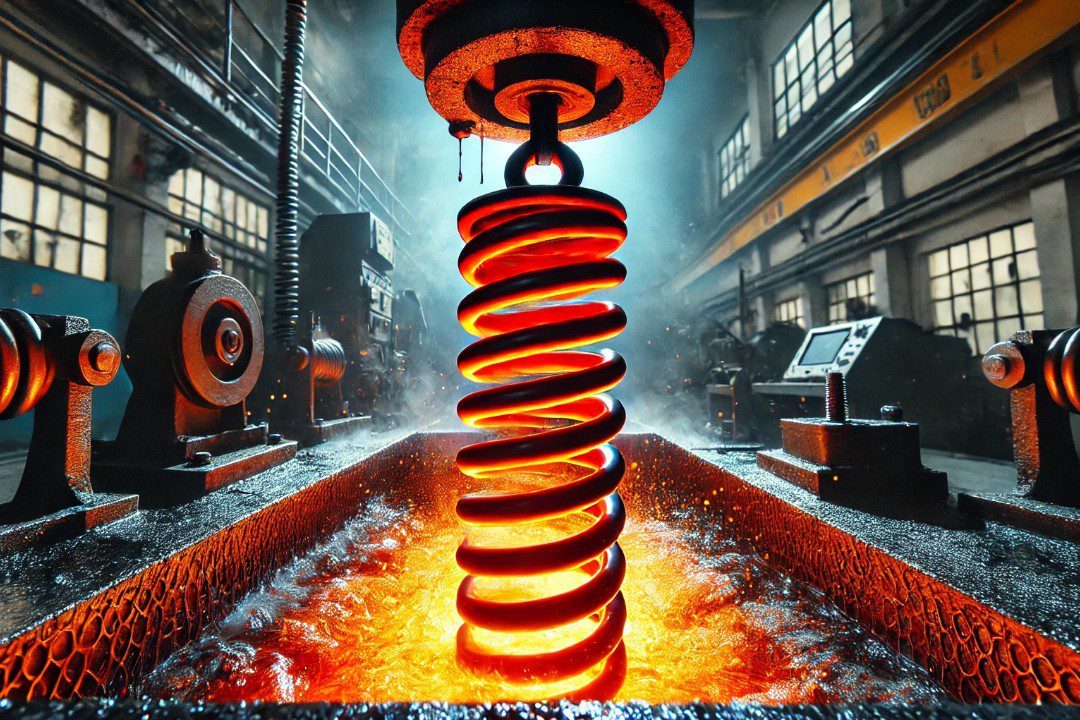Oil tempered steel is a high-carbon steel alloy known for its excellent strength, durability, and ability to withstand repeated stress.
The oil tempering process involves heating the steel and then quenching it in oil, which enhances the steel’s mechanical properties, making it ideal for springs and wire forms used in demanding applications such as automotive, agricultural, and industrial machinery.
At Western Spring Manufacturing, oil tempered steel is commonly used in manufacturing springs due to its high fatigue strength and cost-effectiveness. This material is perfect for applications requiring long-lasting durability and resistance to wear under load.
To explore more about our spring manufacturing processes, visit The Art of Crafting Precision Coil Springs and Wire Forms.
Oil Tempered Steel Material Composition and Grades
Oil tempered steel is primarily composed of carbon, iron, and trace amounts of other elements that enhance its strength and durability. The oil tempering process further improves these mechanical properties.
- High-Carbon Steel: Typically, oil tempered steel contains a high carbon content (around 0.60% to 0.95%), which gives it the hardness and wear resistance needed for springs and wire forms.
- Chromium-Vanadium Alloys: Oil tempered steel grades can include alloys like chromium and vanadium, which provide added strength, toughness, and fatigue resistance for high-performance applications.
Oil Tempered Steel Properties and Characteristics
Oil tempered steel offers a unique combination of mechanical properties that make it well-suited for spring manufacturing. Key properties include:
- High Tensile Strength: Oil tempered steel is known for its excellent tensile strength, which enables springs to withstand high stress without breaking.
- Fatigue Resistance: This material is ideal for springs subjected to repeated load cycles, as it can endure fatigue without degrading over time.
- Elasticity: Oil tempered steel springs maintain their shape even under heavy deflection, providing reliable performance in high-stress environments.
- Corrosion Resistance: Although oil tempered steel is not naturally corrosion-resistant, it can be coated or treated to improve its performance in corrosive environments.
Mechanical properties include:
- Tensile Strength: Typically ranges from 200,000 to 300,000 psi, depending on the grade.
- Modulus of Elasticity (E): 30,000,000 psi.
- Density: Approximately 7.85 g/cm³.
Spring and Wire Form Applications
Oil tempered steel is a popular choice for a wide range of spring types and wire forms used in demanding applications. Common applications include:
- Compression Springs: Oil tempered steel is ideal for compression springs used in heavy-duty applications like automotive suspensions and industrial machinery.
- Torsion Springs: Known for its elasticity and strength, oil tempered steel is used in torsion springs that experience high torque loads.
- Die Springs: Oil tempered steel die springs are highly durable, capable of withstanding high stress and repeated deflections in stamping and die casting applications.
- Wire Forms: Custom wire forms made from oil tempered steel are used in a variety of industrial applications, offering strength and resilience under load.
Industries where oil tempered steel springs are commonly used include:
- Automotive: Oil tempered steel springs are commonly found in suspension systems, valve springs, and other components that require strength and durability.
- Agriculture: Agricultural machinery often uses oil tempered steel springs to withstand the wear and tear of outdoor environments.
- Industrial: Oil tempered steel springs and wire forms are frequently used in heavy machinery that experiences repeated stress and load cycles.
Learn more about how oil tempered steel is used in spring manufacturing in From Automotive to Aerospace: Applications of Springs in Different Industries.
Advantages and Limitations of Oil Tempered Steel
Advantages:
- High Strength and Durability: Oil tempered steel can endure heavy loads and repeated stress, making it ideal for industrial and automotive applications.
- Cost-Effective: This material offers high performance at a lower cost compared to other spring materials like Inconel or stainless steel.
- Fatigue Resistance: Oil tempered steel is specifically designed for applications where springs need to endure repeated deflections without losing their mechanical properties.
Limitations:
- Corrosion Susceptibility: Oil tempered steel is not naturally corrosion-resistant and may require additional coatings or treatments in corrosive environments.
- Lower Temperature Resistance: Compared to high-performance alloys like Inconel, oil tempered steel is not suitable for extremely high-temperature applications.
Oil Tempered Steel Compared with Other Materials
Compared to stainless steel or Inconel, oil tempered steel offers high strength and fatigue resistance at a lower cost. However, it lacks the corrosion resistance and temperature stability of these materials, making it more suitable for environments where these factors are less critical.
For applications requiring extreme heat or corrosive environments, stainless steel or Inconel may be preferred. In contrast, oil tempered steel is ideal for heavy-duty applications where strength, cost-effectiveness, and durability are key factors.
Future Trends and Innovations
With advancements in steel processing and tempering technologies, oil tempered steel continues to evolve. New alloys and treatments are being developed to improve its corrosion resistance and extend its use in more demanding applications.
Additionally, automation in spring manufacturing is streamlining the production process, allowing for greater precision and efficiency when working with oil tempered steel. These innovations are driving the future of spring manufacturing, ensuring that oil tempered steel remains a reliable material in various industries.
Discover how new technologies are impacting spring manufacturing in How Automation is Affecting the Future of Spring Manufacturing.

